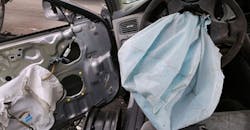Airbag-Maker Takata Brand Disappears as CEO Quits
Takata said on April 12 that its chief had formally resigned after the completion of a takeover by a U.S. firm, bringing the curtain down on the crisis-hit brand tainted by a deadly airbag scandal.
The takeover resulted in the extinction of the 85-year-old Takata brand, with CEO's Shigehisa Takada grandfather starting the company in 1933 as a textile maker.
"We again express sincere apologies to our customers, creditors, shareholders and many others for the great deal of inconvenience related to our airbags," Takata said in a statement announcing the resignation.
Takata's name is now synonymous with the deadly airbag scandal which affected almost every major global automaker, including Toyota and General Motors, and triggered the auto industry's biggest-ever safety recall.
Last June, the firm filed for bankruptcy protection with liabilities reportedly exceeding one trillion yen ($9 billion).
Takata faces lawsuits and huge costs over the defect blamed for 21 deaths, including some cases still under investigation, a company spokeswoman said.
The company's operations -- not including the airbag business linked to the scandal -- have now been taken over by US-based auto parts maker Key Safety Systems (KSS).
KSS, which has been renamed Joyson Safety Systems after the takeover, paid an estimated $1.58 billion for the purchase.
The airbag defect was linked to a chemical, ammonium nitrate, used as a propellant in Takata's airbag inflator canisters.
The chemical degraded, especially in humid conditions, meaning that in some cases the airbag did not inflate properly and sometimes ruptured, firing metal shrapnel at the vehicle's occupants.
Honda, a major Takata customer, first sounded the alarm in 2008.
But the crisis peaked in 2014 when earlier deaths started getting more media attention and the US National Highway Traffic Safety Administration became involved in the ballooning recalls.
Copyright Agence France-Presse, 2018
About the Author
Agence France-Presse
Copyright Agence France-Presse, 2002-2025. AFP text, photos, graphics and logos shall not be reproduced, published, broadcast, rewritten for broadcast or publication or redistributed directly or indirectly in any medium. AFP shall not be held liable for any delays, inaccuracies, errors or omissions in any AFP content, or for any actions taken in consequence.
